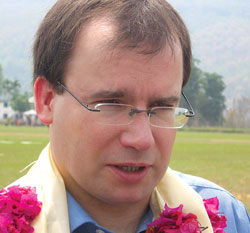|
|
When Gareth Thomas, Britain's minister of International Development arrived in Kathmandu for a four-day visit earlier this month, his first stop wasn't to see ministers or politicians. Instead, Thomas headed out to Sankhuwasabha to see a DfID-supported community forestry project. On the trip, he spoke with Nepali Times about the challenges ahead for the country, the peace process, and increased British aid to Nepal.
Nepali Times: What impression will you take away from Sankhuwasabha?
Gareth Thomas: You really see Nepal only when you go out of Kathmandu. We spoke with people in the districts about their priorities and hopes for development. The most positive aspect of the trip was that the political parties were united and presented a single joint agreement to us. Our impression is that the people in the villages, the chief district officer, the political leadership in the villages, the entrepreneurs all want better roads, irrigation facilities, electricity, good education, and health services.
Do you think British aid has been put to good use here?
One can't generalise, but in Sankhuwasabha's Dhungedhara community forest, the user groups have made wood available to local schools, some schools are running scholarship programs, others have brought in teachers. There are more options to earn income in the region, and the community-centred program has helped improve living conditions of the local people considerably. These are all positive signs.
Some British-assisted projects, such as the Chainpur-Nunkhadi road, have been stop-and-go. Where do you see British aid going now?
During the conflict we cut back on the number of assistance programs. The road was supposed to be 20km long and 40 percent of the work had already been completed when work on it stopped, because our focus was narrowed to education and health. Programs will resume when the elections take place and there is agreement from all sides.
The most important thing is good governance. Political parties should let the people lead-their demands have to be met. The sphere of taxes needs to be increased; this is the only way to create revenue. Donors support national priorities. We want the peace process to move ahead and political parties to clarify their development plans and priorities. In the last few days I have really come to understand how important assistance is to these rural parts, and we are trying to increase our total assistance. I cannot decide alone on these matters because I have to talk to bureaucrats in Kathmandu.
So what will you tell the central level leaders and government representatives in Kathmandu?
This visit to Nepal has made me hopeful, but that is not to say there are no challenges. When I meet with representatives of the government, I will tell them what I heard in these villages. I will try understanding what leaders in Kathmandu are offering these rural areas during the elections. I will include the voice of the people while advising the leaders in Kathmandu and request them to listen to what the people are saying. It is important to understand how Kathmandu's leadership responds to rural demands. Nepalis want the upcoming elections be free and fair and follow the ideals of democracy. The government needs to pay attention to that.
The time for real leadership by parties starts now. Donors can only walk behind the programs, goals, and plans that the political parties and government have made. While the government needs to understand what the Nepali people want, the people should also be patient with the political parties. It is important to see how the interim government will address the priorities, like those set by people in Dhungedhara.
The interim government now includes the Maoists, what's your reading?
To have the Maoists in the interim government is historic, and very encouraging. This government is only the beginning of a stable and strong peace process. The government should immediately start making policies on issues that will be important during the constituent assembly elections.
Will Britain's assistance to Nepal increase?
Assistance will increase considerably. This year British assistance to Nepal was Rs 5.2 billion, which will go up next fiscal year to Rs 5.8 billion. In addition, Rs 438 million has been allocated under the Global Conflict Prevention Pool, and an extra Rs 5 billion will be provided for the peace process and for debt relief. Now, people can question the government if the work being done does not match with the money donors are giving.



